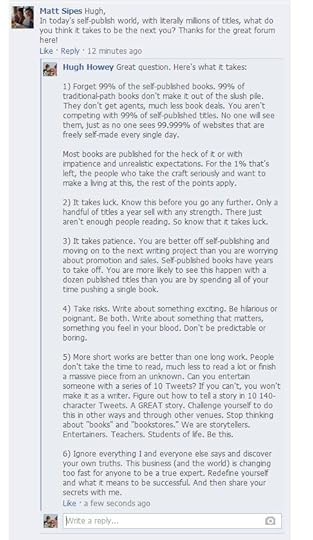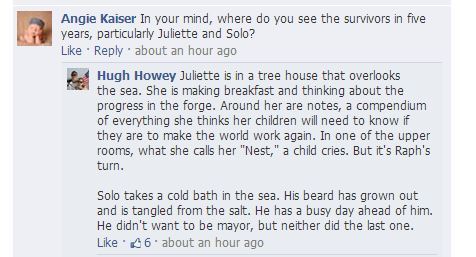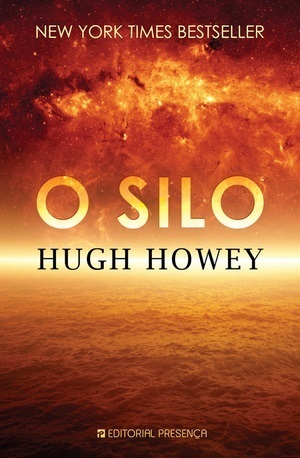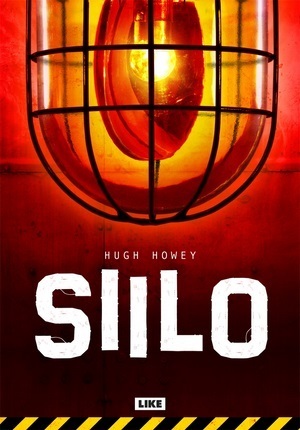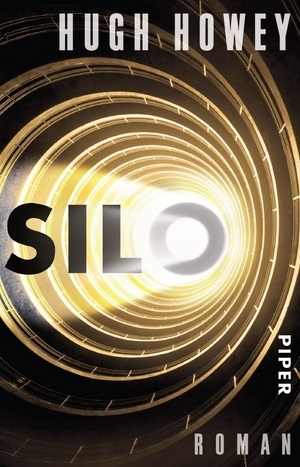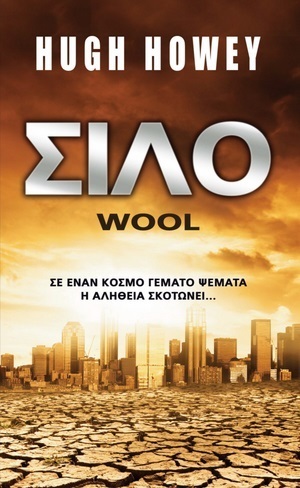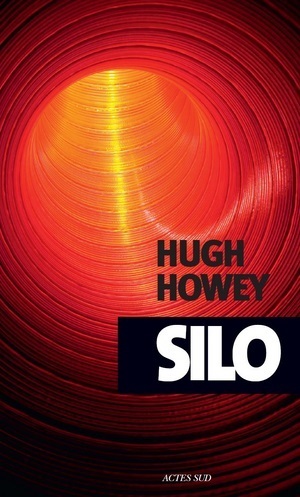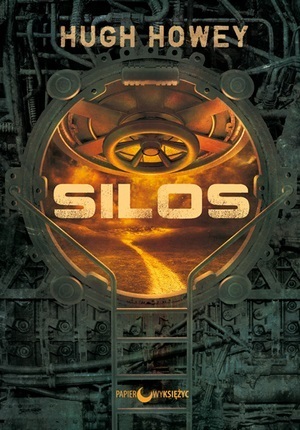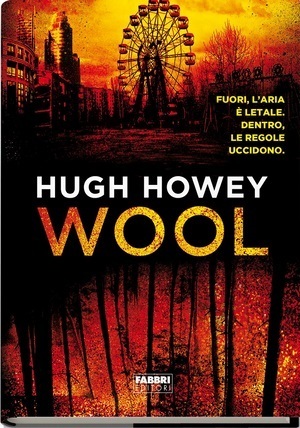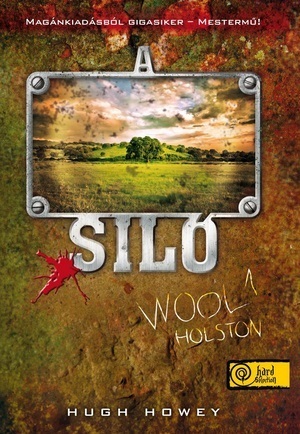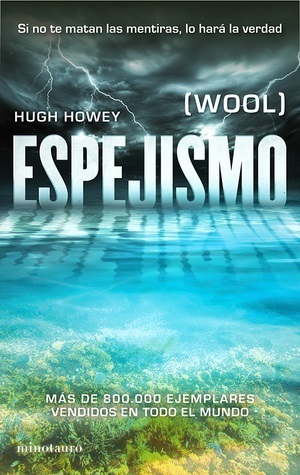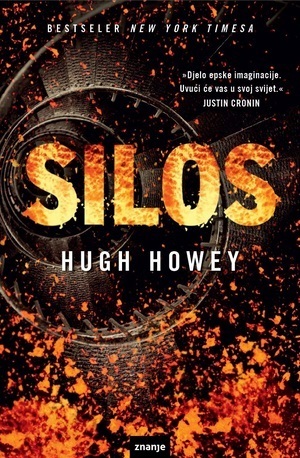Hugh Howey's Blog, page 52
October 10, 2013
October 6, 2013
Off to Frankfurt!
I’m leaving on Monday for the Frankfurt book fair, and then to promote overseas releases in a few countries. Hopefully I’ll think of something to blog about while I’m gone, but things could get a bit quiet around here. Oh, and NaNoWriMo is around the corner. Start brainstorming!
October 4, 2013
Facebook Chat
Random House UK put on a Facebook Chat today, and the questions were awesome. The answers a little less so. Here’s a link to the entire chat, but I thought I’d toss in a couple questions and answers here for the curious. I picked one with writers in mind and one with readers in mind. The latter contains spoilers, so don’t go past the break if you haven’t read the entire series!
October 2, 2013
Bad News About the Thumb Drives
Hey folks, sorry to relate this news, but the second batch of thumb drives were not going to make it to me before I left town for quite some time. I didn’t want those of you with orders to have to wait so long to get them, so I canceled the order from the manufacturer (it wasn’t clear if I would ever receive them, anyway), and I am going to manually refund your orders through Paypal. I’ll also try to send an apology like this one to each and ever email address. It might take me a day or two to sort all of this out, and I’m terribly sorry! Maybe when I get back from this trip and things get settled down, I’ll try to order some of these drives from another source and get them to those who really want them that badly. I’ll be doing signed books again in December, so that might be a nice time.
My deepest and sincerest apologies, everyone. This is certainly not what I had hoped for.
Making a living as an author(s)?
Remember Franklin W. Dixon? What about Carolyn Keene? Both had productive and profitable writing careers. And neither of them ever existed.
What is the recipe for writing success? Steady and reliable releases. Look at the top authors across both indie and traditional methods and you’ll find a stream of books that keep themselves in the public consciousness while delivering what’s expected of them. One book a year is not enough to launch a career. I’ve seen indie authors hold back their books until they have enough stored up for monthly releases, just to give themselves a better chance. On the traditional side, you have heavyweights like James Patterson and Nora Roberts, who provide several books a year, each and every year. How can aspiring writers emulate this success? Teamwork.
The Nancy Drew and Hardy Boys books were the brainchild of Edward Stratemeyer, a publisher who employed many authors all ghostwriting under the same name. A group of indie authors could do the same thing and be paid much better than Stratemeyer’s writers. I have a good friend who writes under a pseudonym with her husband, and this teamwork means more releases, a second person promoting the works, and the energy that comes from having more than one person united under a common cause.
As far as I know, the Statemeyer model has not gone indie yet, but there isn’t any reason it couldn’t. Imagine six talented and unknown authors meeting on a forum or a local writing club. They share a love of a genre, perhaps spy thrillers with a hint of romance. With a name settled upon, and agreeing to a length of 40,000 to 50,000 for each story, they begin brainstorming characters and settings. They lay down a handful of plots, each seizing on their own or a favorite from the group. And then they begin writing.
In two months, you have a half dozen drafts, maybe more. Enough for monthly releases, and if they keep writing, perhaps a new release every two weeks or even weekly. The writers pool resources for editing and cover art, both of which add constancy to the material (a good editor would help blend styles. Even better if a member of the group had polishing duties, similar to how Patterson operates). Because of the steady releases, there’s a much better chance of discovery. There will always be one or two books in the Hot New Releases category. There will be six people to share blogging duties, to post on social media, to tap into friend/family networks, and so on.
Now, if anyone has ever worked in a group, they know how miserable the affair normally turns out. But I think a coalition of writers could work with the right, motivated members. The potential for success is so much higher than working alone. You would need solid contracts signed by all members, of course. I would model this contract on author-agent contracts, where a member can leave with written notice, and they would only receive future royalties on books already published. You would want to split up publishing duties, and there would be a lot of trust involved. But hey, being a writer isn’t easy no matter how you go about it. For all the downsides, there are some incredible upsides. Writing with others could help with output and combat against writers’ block or procrastination. It could make writing more social and fun. I certainly think it would help aspiring writers find an audience more quickly. And even with the six-way split, it would be profitable in far less time.
The worst case scenario is that each author writes a few books that go undiscovered. In which case: dissolve the partnership, leave with your own property, file off the serial numbers (change character and place names), and publish under your own names. Hey, you’ve written a few books. That’s a win in my view. You’ve got a lot of practice under your belt and you learned something from the group. But I think the chances are more likely that you’re cruising around like Nancy Drew at the end — in a blue Roadster with the top down, thinking about your latest mystery.
September 29, 2013
The Order by Steve Litras
Original music set in the world of SHIFT by Steve Litras. How awesome is this?
USB Drives and Some Travels
A massive apology to those who have ordered Silo Thumb Drives and haven’t received them yet. I had a run on the first batch, and the second order was severely delayed by the manufacturer. I should have these in this week and will turn them around and ship them out to you immediately. These drives will have one extra read on there, an entire issue of LightSpeed magazine that includes a story I wrote. Thanks so much for being patient about this.
Also: I’m going to be moving around a bit between now and Thanksgiving. My response time for emails and other contacts will no doubt suffer. I’ll try to update the site with where I am and what I’m doing, so you can share in my jetlag.
September 27, 2013
MASSIVE SPOILERS!

We had a Q&A session at a Boston event last weekend, and a reader wanted to know if they could ask questions about DUST. Most of the audience had only read WOOL, so I suggested we do something online at a later date. And then yesterday, I received an email from a reader with a load of questions, and after firing off my responses, I thought they would make a good launching point to really dive into the trilogy.
I have blogged about this before, but I should say again that I write primarily for myself and for the repeat offenders. I have in mind the readers who might go back and revisit a text and catch all the foreshadowing and layers of meaning. Assembling a novel is like building a crossword for me. There’s a great review and response on Amazon for A WALK UP NAMELESS RIDGE that captures some of this. What follows is a discussion about the thought processes I had while writing this series. Feel free to chime in with your own questions.
Dear Mr. Howey,
I have just finished reading the trilogy and thoroughly enjoyed the entire series. However, some threads were left unexplained and I would be most grateful if you would be kind enough to answer the following questions so I can sleep at night!
1. No explanation was given as to what happened when they first went into the silos. I’m curious as to why the women meekly agreed to be put to sleep, or did they offer some kind of resistance?
Almost everyone was put to sleep, not just the women. Only a single shift remained. There were pockets of hysteria, but most of these people were prepped for this from the beginning. Donald was an exception, as he joined just the day before.
2. How come Thurman and Donald were able to go outside without protection and survive? Did Thurman have such a build up of good nanos that he could survive anything? I thought Donald also had some nanos in his system – were they not enough to fully protect him? This whole area of the story is rather confusing.
Exactly. The good nanos. Everyone in the original silos had them (it was why they didn’t die on the day that everyone on planet Earth did). They got more during each sleep. Both men were ravaged by the outside air, but both were given treatment and put back in the pods. Donald got out early and didn’t get more treatments, which was why he went downhill.
3. No explanation was given regarding The healing of Julliette’s scars. Did she receive some good nanos when she entered silo 17 the first time? If so, why did she not also receive bad nanos and be coughing like Donald? Why was Juliette not more curious about all this?
She was very curious, but worse things were happening. Silo 17 received a massive dose of good nanos from Silo 1 (with Silo 40 assisting). It was why anyone (like Solo) survived there. Passing through Silo 17 gave everyone from 18 a dose of the stuff. It’s questionable whether they would have survived the journey overland otherwise.
4. When Donald destroyed silo 1, wouldn’t this have caused the catastrophic failure of all the other silos? He was effectively killing mankind, not saving it. Was this his intention? Am I right in this assumption?
Silo 1 collapsed, but the sequence to collapse other silos would have to have been engaged. Donald knew how this worked, having done it once himself. He was destroying the place that could destroy the other places, leaving them to live their lives without threat or intrusion.
5. I don’t get why the devastation only occurs around the silo areas. If the world was destroyed, how come they are able to walk to a perfectly safe area just a short distance away. How come the bad nanos did not pervade everywhere. I don’t get this part of the story at all. I was hoping this would be explained by the end of the book but I feel as though either I’ve missed some important hint in the story to resolve this or I’ve been left hanging which is weird and a bit frustrating.
The nanos were able to target based on species (the original threat was based on race, made by elements in the Middle East and Israel). All of mankind was infected over the years. Invisible bombs lie in every person’s bloodstream. Only those inoculated (by visiting the nano treatment chambers) survived the day the nanos went off. Planes would have plummeted from the sky, cars would have swerved and crashed, but the people at the national convention and every other living thing were perfectly okay. This is all technically feasible and probably 100-200 years from being possible, btw.
The length of time spent underground was to ensure that no pocket of humanity anywhere else survived, and also to kill off the memories of those who might whisper across generations. The nanos were programmed to create a dome of death around the silos to prevent any silo from escaping early. Everywhere else, nature was thriving.
6. The storyline surrounding religion is a little weak and not developed enough if you don’t mind me saying. it appears to go off on some kind of strange tangent in the third book that doesn’t really add anything to the story or fit with how the silos are organized. Where does that story go in the end?
It was meant to highlight the dichotomy in the Bible of salvation or damnation. Juliette could have used the blast charges to go out and get revenge and kill. She used them instead to open up the 51st silo, which was their salvation. We make choices like this every day. Do we use our energy to build things up or tear them down? How is religion used? How should it be used?
Some of the church members left with Juliette. Some stayed. Is it better to live a harsh life in the hopes of some eternal reward? Or is it better to work hard to make this world a better place?
I hope you don’t mind my asking all this. I really did love the books and now have my son and daughter hooked on them. I can’t wait to see how the film turns out and best of luck with it all.
Kind regards,
Phyl
September 25, 2013
Worldly Wool!
Next month, I’ll be heading to Frankfurt for the book fair, where I’ll have the privilege of meeting many of my foreign publishers. We just agreed to a deal in Indonesia yesterday, which put the foreign contracts at 30, and the foreign territories a shade over (counting Australia, New Zealand, and the UK separately). Pretty crazy journey for a novelette that I thought no one would ever read.
While I’m overseas, I’ll also be hopping around a bit for various book launches. France, Spain, Italy, Finland, and the Netherlands are all on the docket. I haven’t been to this many countries on one trip since my parents took me to Epcot Center. To celebrate, I thought I’d share some of the cover art we’ve received from publishers thus far.
September 22, 2013
Very Small Rocks?
Well, this has been a problem for a while, and it’s in need of a solution. I’m not sure that I have a good one. The problem stems from another very real problem, which is that authors fake reviews and pay for reviews. It’s not just authors, of course. This is a problem in the restaurant and hotel industries, and probably every industry where reviews correlate with income. There are those who fake positive reviews for gain and competitors who fake negative reviews for spite. It has been covered in the New York Times and on hundreds of blogs and other outlets. It’s a real problem with serious consequences and no easy solution.
One of the many problems that stems from this is that innocents are lumped in with perpetrators. The sports world has been dealing with this for a while now, as those who use performance enhancing drugs cast a dark shadow over those who don’t. And when national heroes like Lance Armstrong and Roger Clemens are implicated, the assumption becomes that everyone does it. But everyone doesn’t. Except that it’s practically impossible to prove a negative.
You can clock me speeding down the road and give me a ticket, but how can anyone who drives a vehicle prove that they never speed, not ever? This is the classic recipe for a witchhunt. Anyone can accuse, and the only defense is to profess innocence, which is what the guilty and innocent do in equal measure. I find that it’s quite fitting that I’m sitting here in Boston, just a stone’s throw from Salem, thinking about these things.
A fellow writer has spent the last month being hounded by an anonymous accuser. This person is claiming that she pays for reviews. There is no evidence, but of course, the author can’t prove the negative. Compounding this injustice is the fact that the accused author has dedicated much of her time and energy into fighting for the rights of other authors. I can’t go into detail without outing her, and the details aren’t important.
During this month-long vendetta, hundreds of other authors have been accused as well. These lists of names are being used in an attempt to buttress the vapid case against her, and I know several of the other authors on this list quite well. I’ve received emails from several of them and others on the list, and by their shock and indignation (and association with them, both in person and online), I don’t doubt their innocence. Why? Because it is very easy to know how innocent people get tangled up in this when you are one of them. These days, bestselling authors with a ton of reviews are presumed guilty until proven guilty. Ask any major-leaguer who leads the league in home runs what they go through as the season progresses. This is the new and ugly norm.
Along with an inability to prove innocence, there are many ways to appear guilty. If you publicly appreciate reviews, as I have, you’ll get a lot of first-time reviewers, which is supposedly an indication of guilt. And if you are a bestseller, you’ll get a lot of tack-on reviews that are designed to make the professional (hired for pay) reviewer look legit, which means the stain is now equally on you. In fact, if someone wanted to “prove” you engaged in this behavior, it would only cost them $50 to buy 10 reviews for your books. It’s easier than leaving a syringe in your locker.
People whom I admire are wondering what they can do about this. I understand their frustration. It’s hard to know what you can do, other than turn to loved ones for support. I used to protest these accusations on Facebook, where I felt that I was safe with friends, only to have people claim that I was trying to raise a posse. I’ve responded to accusatory reviews by politely saying that I would never engage in such behavior, only to be told that it’s rude of me to respond to this libel. I’ve since learned that the people who point and scream “witch” are given much support by those who tamp down any attempt at claiming innocence. The rules are simple: Anyone can cast aspersions on your character, and you’re not allowed to defend yourself. You are tied to the stake and expected to enjoy the burn.
The most common advice given is silence, to just ignore it, and I have mostly heeded this advice. I have chickened out. It has left me feeling like I did in middle school, where I was regularly bullied. I remember pretending to be sick so I didn’t have to go to school and deal with a kid who once pointed a gun at my brother, pulled the trigger, and laughed when it clicked. A kid who pushed us into thorny bushes (why the hell do they plant those at schools?) and who roughed us up when anyone wasn’t looking. I really did feel sick most mornings. My stomach would twist up in knots, and I lived in constant terror that I’d be targeted on a whim. I was also afraid to stick up for anyone, because I didn’t want to be targeted. We all felt this way.
This is very much what it feels like to have a public presence that can be torn down at any time, this feeling of vulnerability and fear. The people who do the accusing have nothing to lose. Some seem to take sport in it. Some, I’m sure, feel that they are doing the world a favor, and that it’s okay if a few innocents are lumped in with the perpetrators. This is the dark slice of what is otherwise an amazing ability to connect with readers, 99% of whom are positive, supportive, and wonderful. But it’s that other 1% that you live in terror of. And you know that if you say anything, if you stick up for a friend, that you’re next.
In a forum thread yesterday, anyone who spoke up about a similar issue promptly received a spate of 1-star reviews from one of these accusers. Over a hundred books in an hour were hit, including all of mine. I personally don’t care, as I am lucky to have tremendous support and an incredible number of unassailable reviews from readers, bloggers, and major media outlets. But I am watching friends get attacked. And they have much more to lose than I do. And I think I’ve been a chickenshit for quite long enough. I’m more than a little upset at myself for being such a coward for so long.
I don’t know if this is the best solution, because there isn’t really a good one, and there are elements of this solution that make me feel really hurt inside. It requires me bringing my previous dog into this, Jolie, whom I loved more than life itself, and whom I can’t think about without crying. (Yeah, I’m one of those weird dog owners. I accept that.) I really hate dragging her into an ugly debate, but the same reason I hate this is the same reason she’s needed. It’s because no one who knows me can doubt how I feel about her. Linking this surety to an unknown, to an unknowable, to an accusation, is the best solution I can think of. (It helps that Jolie never knew what in the world I was mumbling to her all those years; she just knew that I loved her and that she loved me. Which was enough.)
What we need are declarations that are unassailable. Perhaps these don’t exist, so they have to get as close as possible. And these declarations are not meant for those who don’t know us but for the ones who do. Because it’s the baseball player who worries what his mom thinks—this is the baseball player who tosses and turns at night. “Mom, I’m innocent” might not be enough. He wants her to really know. He wants his teammates to know. His loved ones. His true fans.
That’s who this is for. Because plenty of other people with blackness in their hearts will assume guilt until guilt is proven. What they choose to believe, however, says plenty about them while leaving the facts unchanged. This is an important truth to grasp. Knowing yourself is the most important thing. Watching others pick and choose how they know you—this tells you all you need to know about them. I felt liberated when I realized this. I began to see others for how great and not-so-great they are. (The next step is to learn not to judge them when they do not-so-great things.)
Without further ado, what follows and concludes this post is my Declaration of Integrity. It’s for my mom and for the people who matter the most to me. For my wife and my sister and my colleagues and the readers who appreciate my work and have written so many amazing emails, comments, and reviews. I thank you. Perhaps this is something other authors will find useful to do for themselves, but I also urge those who want to stay quiet to stay quiet. This is a risky thing, inviting attack and attention. You have my sympathy and support, however you handle this. Everyone will seek out their own solution. But I’ve waited far too long to say this:
I, Hugh Howey, have never paid for a book review in my life. I swear this on my life and on the life of my beloved dog and faithful companion of ten years, Jolie. May she rest in peace. And may the accusers and accused alike find peace in their hearts as well.


